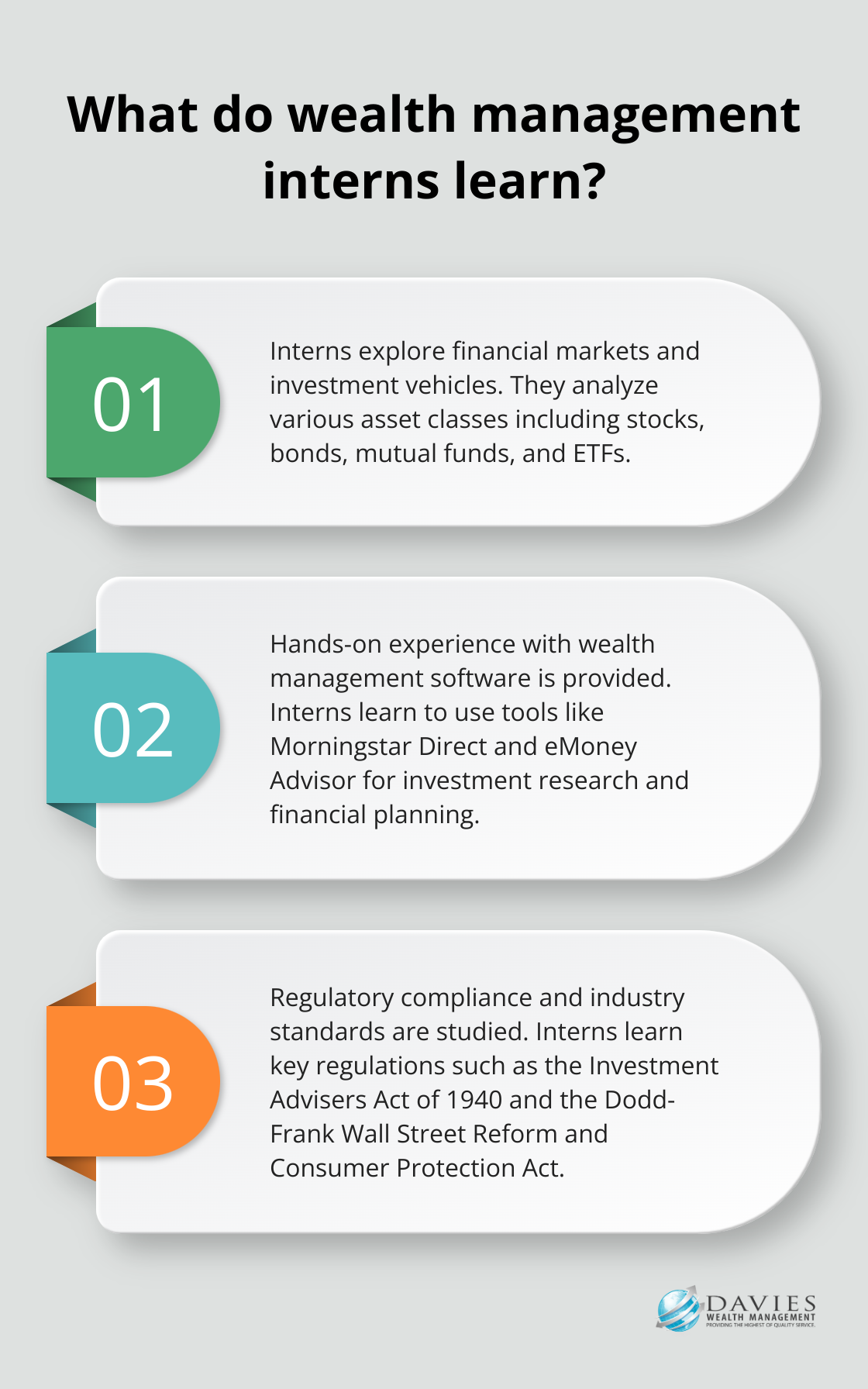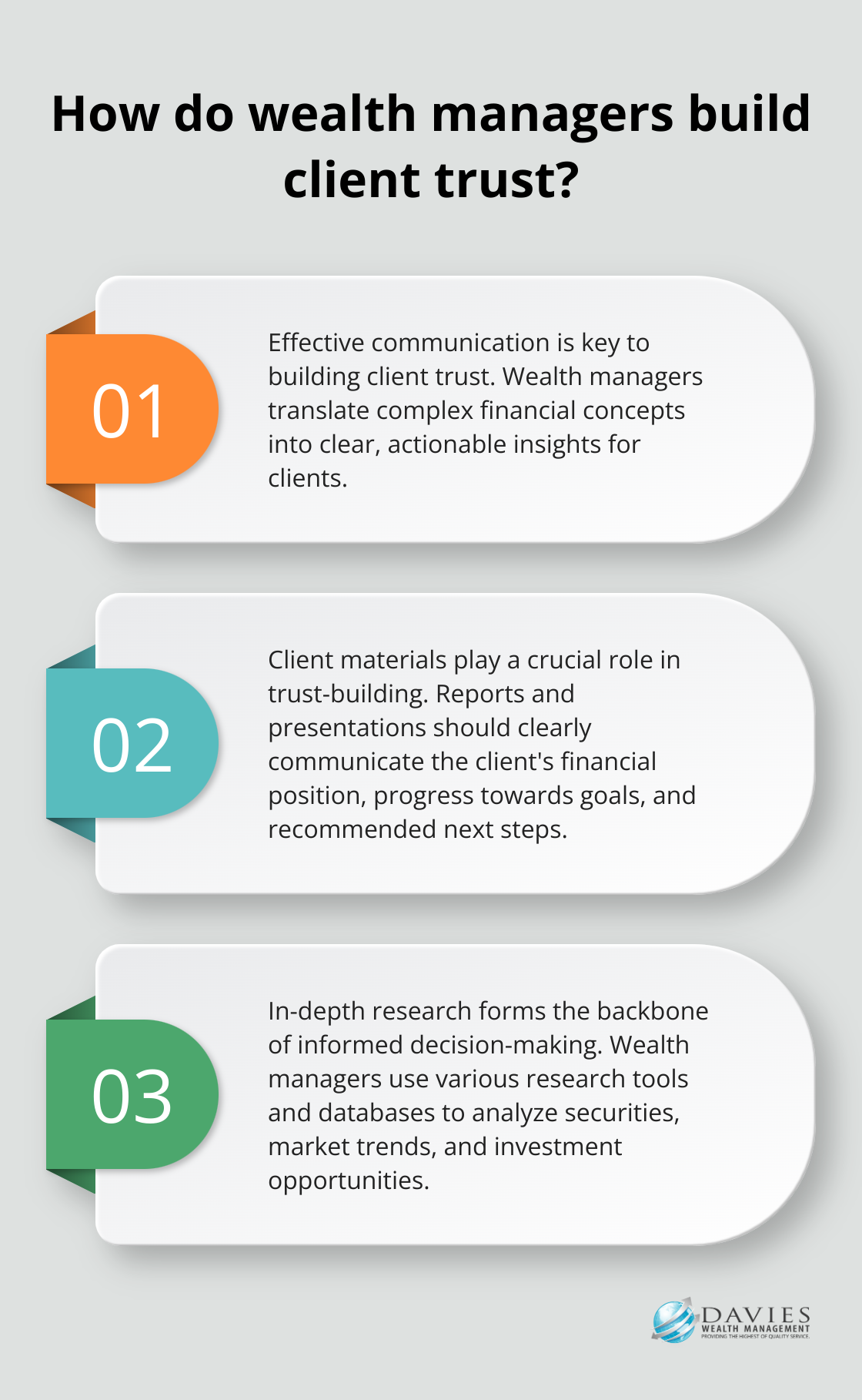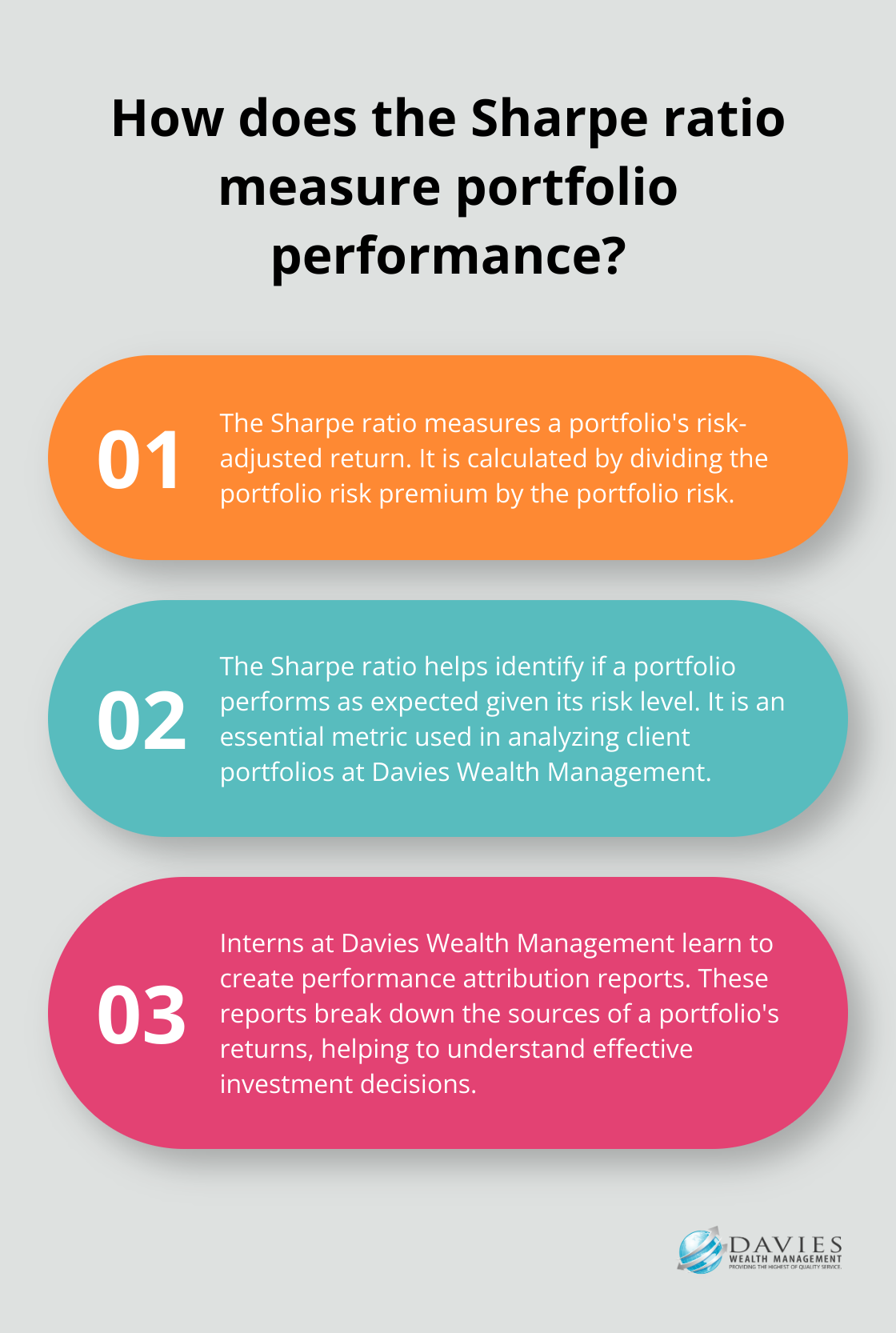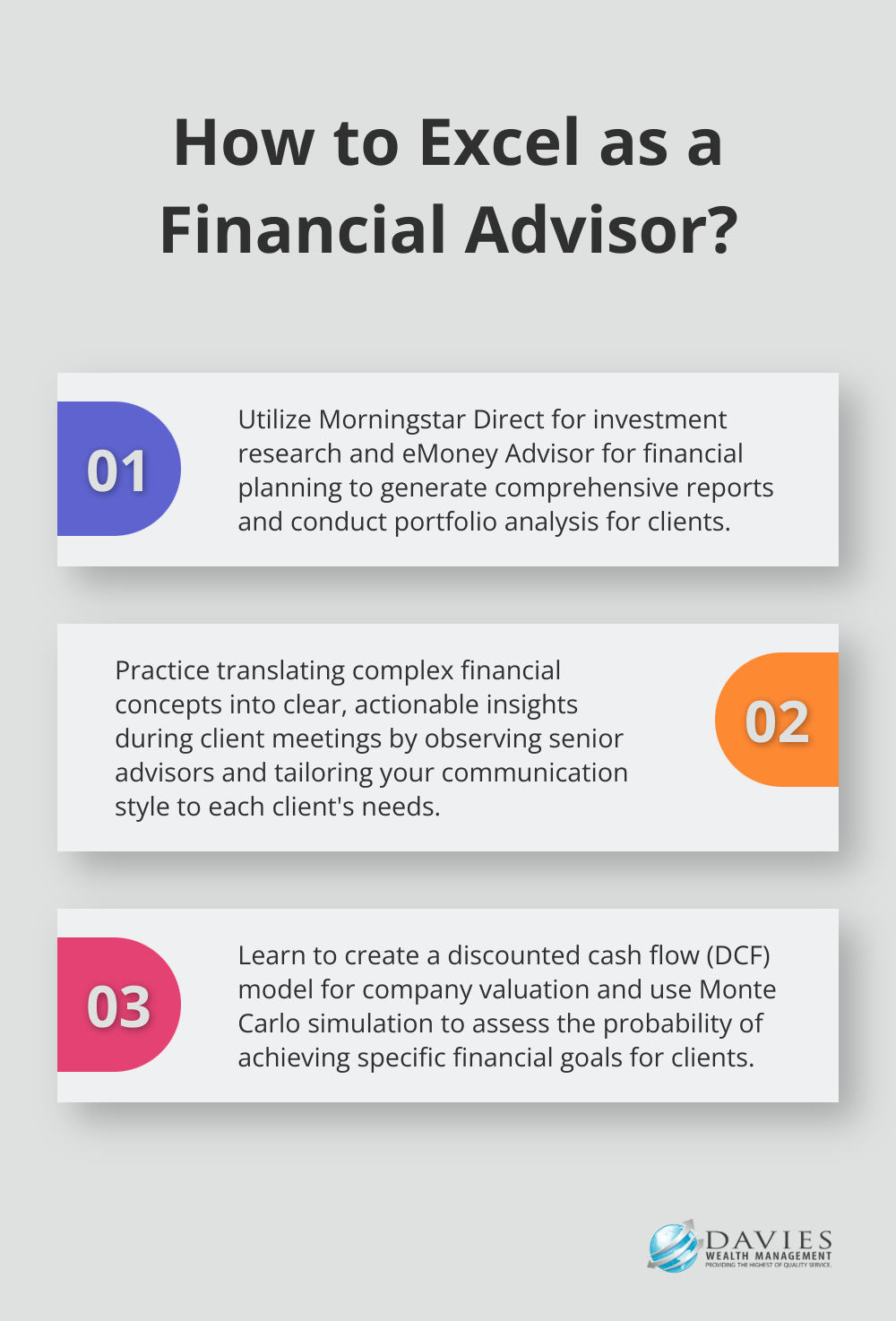At Davies Wealth Management, we understand the importance of internships in shaping future wealth management professionals. While many aspiring interns may be familiar with private banking, wealth management offers a distinct and comprehensive approach to financial services.
This blog post will outline the key responsibilities and expectations for wealth management interns, providing valuable insights for those looking to kickstart their careers in this dynamic field.
What Does a Wealth Management Intern Learn?
At Davies Wealth Management, we believe that a successful internship in wealth management builds on a solid foundation of industry knowledge and practical skills. As an intern, you’ll immerse yourself in a dynamic learning environment that covers three critical areas: financial markets and investment vehicles, wealth management software and tools, and regulatory compliance.
Mastering Financial Markets and Investment Vehicles
Your journey starts with an exploration of financial markets and investment vehicles. You’ll analyze various asset classes, including stocks, bonds, mutual funds, and exchange-traded funds (ETFs). This knowledge proves essential for constructing diversified portfolios that align with client risk profiles and financial goals.

You’ll also study alternative investments such as real estate investment trusts (REITs), hedge funds, and private equity. These vehicles play an increasingly important role in wealth management.
Navigating Wealth Management Software and Tools
In today’s digital age, proficiency in wealth management software is essential. You’ll gain hands-on experience with industry-standard tools like Morningstar Direct (for investment research and analysis) and eMoney Advisor (for financial planning and client relationship management).
These tools allow you to generate comprehensive financial reports, conduct portfolio analysis, and create financial projections. This technical know-how proves invaluable in serving clients effectively.
Understanding Regulatory Compliance and Industry Standards
The wealth management industry operates under strict regulations, and understanding these rules protects clients and maintains the firm’s integrity. You’ll study key regulations such as the Investment Advisers Act of 1940 and the Dodd-Frank Wall Street Reform and Consumer Protection Act.
You’ll also learn about fiduciary responsibilities and ethical standards in wealth management. Professions help maintain trust in an industry by establishing codes and setting standards that put a framework around ethical behavior and technical competence.
As you complete this foundational learning phase, you’ll transition to the next exciting aspect of your internship: supporting client relationships. This hands-on experience will allow you to apply your newly acquired knowledge in real-world scenarios, further enhancing your skills and understanding of the wealth management industry.
Building Client Trust Through Effective Communication
Mastering Client Interactions
At Davies Wealth Management, we prioritize supporting client relationships as the foundation of successful wealth management. As an intern, you’ll contribute to fostering these relationships through effective communication, meticulous preparation, and thorough research.

Your role in client communications will encompass various tasks. You’ll assist in drafting emails, preparing meeting agendas, and participating in client calls or meetings. This hands-on experience will help you develop the skill of translating complex financial concepts into clear, actionable insights for clients.
During client meetings, you’ll observe how senior advisors navigate difficult conversations, address concerns, and build trust. We recommend you pay close attention to their communication styles and how they tailor their approach to each client’s unique needs and personality.
Crafting Compelling Client Materials
You’ll dedicate a significant portion of your time to preparing client reports and presentations. This task requires attention to detail and the ability to distill complex financial data into easily digestible formats.
You’ll use various software tools to create visually appealing and informative materials. For instance, you might use Bloomberg Terminal to gather market data, Excel for financial modeling, and PowerPoint for creating sleek presentations.
The goal extends beyond presenting data; it’s about telling a story. Each report or presentation should clearly communicate the client’s financial position, progress towards goals, and recommended next steps. When crafting these materials, remember to be clear about your objectives, build your presentation around strong messages, and design it with your audience in mind.
Conducting In-Depth Research
Research forms the backbone of informed decision-making in wealth management. As an intern, you’ll conduct research for client portfolios and financial plans.
This might involve analyzing individual securities, researching market trends, or studying new investment opportunities. You’ll learn to use various research tools and databases (such as Morningstar), and to critically evaluate information from multiple sources.
Your research will directly inform investment decisions and financial strategies. For example, you might research the potential impact of a new tax law on a client’s estate plan, or analyze the performance of a particular sector to inform portfolio allocation decisions.
As you immerse yourself in these client-focused responsibilities, you’ll gain invaluable experience in the practical application of wealth management principles. This hands-on learning will complement your theoretical knowledge, preparing you for the next phase of your internship: developing analytical skills that will set you apart in the field.
Sharpening Your Analytical Edge
Master Financial Data Analysis
At Davies Wealth Management, we believe that strong analytical skills are essential for success in the wealth management industry. As an intern, you will analyze and interpret financial data. This involves examining client portfolios, evaluating investment performance, and identifying trends that could impact financial strategies. You will work with large datasets, using tools like Excel and Bloomberg Terminal to extract meaningful insights.

You might analyze a client’s portfolio to determine its risk-adjusted return using metrics such as the Sharpe ratio. The Sharpe Ratio is calculated by dividing the portfolio risk premium by the portfolio risk. This analysis helps identify whether the portfolio performs as expected given its risk level.
You will also learn to create performance attribution reports, which break down the sources of a portfolio’s returns. This skill is invaluable for understanding which investment decisions have been most effective and where improvements can be made.
Build Robust Financial Models
Creating financial models and projections is another critical skill you will develop during your internship. These models serve as the foundation for investment decisions and financial planning strategies.
You will learn to build models that forecast cash flows, estimate future asset values, and project potential investment returns. For instance, you might create a discounted cash flow (DCF) model to value a company or a Monte Carlo simulation to assess the probability of achieving specific financial goals. Monte Carlo simulation is a statistical method applied in financial modeling where the probability of different outcomes in a problem cannot be simply solved.
Model building isn’t just about crunching numbers. You will need to understand the underlying assumptions and explain them clearly to both colleagues and clients. This skill combines technical proficiency with clear communication, a hallmark of successful wealth managers.
Conduct Comprehensive Market Research
Market research forms the backbone of informed investment decisions. As an intern, you will research various industries and market sectors to identify trends, opportunities, and potential risks.
This research goes beyond simply reading financial news. You will learn to analyze industry reports, company filings, and economic indicators to form a comprehensive view of the market landscape. Financial analysis involves examining financial statements to derive insights into a company’s performance. For example, you might research the impact of new regulations on the healthcare sector or analyze how changing consumer behaviors affect the retail industry.
You will also gain experience in competitor analysis, studying the strategies and performance of other wealth management firms. This knowledge is important for understanding our position in the market and identifying areas for improvement or differentiation.
We encourage our interns to think critically about their research findings. It’s not enough to simply gather information; you need to synthesize it into actionable insights that can inform investment strategies and client recommendations.
The ability to analyze data, create robust models, and conduct thorough market research are skills that will set you apart in this competitive industry (and potentially lead to exciting career opportunities).
Final Thoughts
A wealth management internship provides hands-on experience in a dynamic field. You will develop a strong foundation in financial markets, investment vehicles, and industry-specific software tools. You will also gain insights into regulatory compliance and ethical standards that govern the wealth management industry.

The internship allows you to hone communication skills and learn to translate complex financial concepts for clients. You will contribute to client reports, presentations, and research, developing the ability to tell compelling financial stories through data. The analytical skills you acquire during your internship are invaluable and will set you apart in the competitive world of wealth management.
Davies Wealth Management commits to nurturing the next generation of wealth management professionals. We encourage you to pursue these opportunities and embrace the learning journey in this exciting field. Understanding the difference between private banking and wealth management (which offers a more comprehensive approach) will further enhance your career prospects.



Leave a Reply